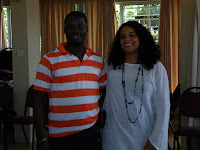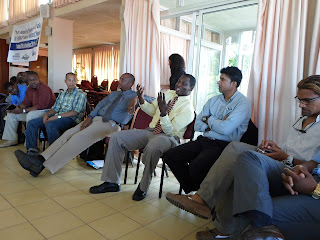 Last week, in the days approaching Dominica’s 34th
year of formal independence, invited guests of UN Women and members of the Caribbean Male Action Network (CariMAN
http://cariman-org.tumblr.com/) –
a diverse and dispersed web of Caribbean men connected by common concerns with
issues of gender - arrived on the ‘Nature Isle’ to
participate in a 3 day conference. The conference, supported and coordinated by
UN Women, was entitled ‘Men as Partners for Gender Equality and the Elimination
of Violence Against Women’.
Last week, in the days approaching Dominica’s 34th
year of formal independence, invited guests of UN Women and members of the Caribbean Male Action Network (CariMAN
http://cariman-org.tumblr.com/) –
a diverse and dispersed web of Caribbean men connected by common concerns with
issues of gender - arrived on the ‘Nature Isle’ to
participate in a 3 day conference. The conference, supported and coordinated by
UN Women, was entitled ‘Men as Partners for Gender Equality and the Elimination
of Violence Against Women’.
As Dr Peter Weller the regional director of CariMAN
(and psychologist by trade and training) laid out in his opening notes, the 3
day meeting intended to provide a forum for self inquiry and the questioning of
gendered concepts, assumptions and experiences. The attendees were a diverse
group of lawyers, researchers, students, teachers, social workers, religious
leaders, sexual health activists, police men and NGO workers hailing from all across
the Antilles and its diaspora. Thomas Holmes (Ministry of Education,
Dominica) the head of CariMAN Dominica chapter also offered a warm welcome to
all present; as did Gabrielle Henderson (UN Women), the event
coordinator.
Day 1:
 After the formalities and protocols of the introductory
session, the group opened out into a round with chairs placed along the
perimeter of the room to offer an open space for exchange and conversation. ‘Arts
in Action’ (http://www.artsinaction.org/meet-the-team/),
an applied performance arts collective based at UWI St Augustine, then entered
the space calling us to our feet. They immediately stimulated the room and all
within it: inviting us to move through the space and interact with one-another to
the irresistible rhythm of the djembe drum. Call and response exercises and
short thought provoking skits (e.g. ‘I Tarzan, she Jane’ – on gender roles and
sexualities) followed, offering an invigorating beginning to the process of
gendered self reflection we had been called to undertake. And with their
uninhibited and fun approach, it felt as though a ‘safe space’ of respect for
confusion, questions and difference had been implicitly inaugurated.
After the formalities and protocols of the introductory
session, the group opened out into a round with chairs placed along the
perimeter of the room to offer an open space for exchange and conversation. ‘Arts
in Action’ (http://www.artsinaction.org/meet-the-team/),
an applied performance arts collective based at UWI St Augustine, then entered
the space calling us to our feet. They immediately stimulated the room and all
within it: inviting us to move through the space and interact with one-another to
the irresistible rhythm of the djembe drum. Call and response exercises and
short thought provoking skits (e.g. ‘I Tarzan, she Jane’ – on gender roles and
sexualities) followed, offering an invigorating beginning to the process of
gendered self reflection we had been called to undertake. And with their
uninhibited and fun approach, it felt as though a ‘safe space’ of respect for
confusion, questions and difference had been implicitly inaugurated.
And confusion, questions and differences would most certainly emerge
as the group began making sense of the many presentations that followed. Dr Hazel
Da Breo (Psychotherapist / Family Therapist) and Alex P Vega (PhD
Candidate/ UN Women Consultant), both offered thought
provoking presentations questioning gender essentialisms and patriarchal forms
of oppression (Da Breo); and interrogating common understandings of gendered identities
and sexualities (Vega).
The goal of both presentations was to destabilize dominant gender
concepts – and more importantly challenge the audience to cognitively unpack their own taken-for-granted gender
concepts - which are understood by the presenters to reinforce/re-inscribe a
patriarchal order of things in Caribbean societies (and worldwide). New terms and,
idioms were offered as a means of talking about sexualities, gender, women and relationships
in non-sexist ways .
Yet the presentation of concepts deriving from North American and
European queer/feminist academic theory to an audience of Caribbean men was
always likely to demand a process of dialogue to reconcile diverse gendered
understandings that emerge from quite different contexts. Much work and negotiation
took place on the part of the men present as they sought to square the
open-ended notions of gender and sexuality they were being told about, with the
gendered meanings operating in the contexts in which they live.
Fundamental questions concerning what makes a man or woman; who can ‘mother’ or ‘father’; and what range of sexualities exist in the world were discussed. During these discussions much laughter reverberated through the room. For the most part baffling and transgressive ideas were processed in the spirit of humour, rather than dismissed or ignored. Disagreements did arise, but these were understood to be integral to the gender work the men were engaged in. Indeed, one delegate remarked: “a quarrel is required” to work through the themes discussed, and render them appropriate oneself and others around us. Many questions remained, and came to be accompanied by new ones throughout the day. However, in the interest of the conference aims – the process of inquiry had begun.
Day 2:
Presentations by a number of researchers and NGO workers
followed on the second day:
Corin Bailey (Sociologist/ Social Geographer, UWI,
Cave Hill) presented research on violence and masculinities among Caribbean young
men. He concluded that despite some alternative ‘positive trends’, valorised
dominant masculine attributes reinforce and naturalise violence among young
men; and between young men and their female partners.
Nicholas Gilbert (Researcher IGDS/ Life Skills
Coordinator, Ministry of National Security, Trinidad and Tobago) presented on
masculinism and criminality. He concluded that masculinist ideals concerning
individual strength, independence, the imperative to provide for family and a
rejection of feminine forms are all generative of criminality within the Trinidadian prison in which he did his study.
 In response to these two presentations the discussions
shifted towards the relationship between ‘fatherhood absence’ and Criminality. A
pastor from Guyana highlighted the paradox whereby patriarchy has been deemed a
central problem and cause of violence/criminality (with masculinism and
hegemonic masculinities constitutive aspects of patriarchy), and yet mother-centered households who are lacking that patriarchal figure are also seen as the cause
of violence/criminality. This latter question concerning of the pathologisation
of female centered households lies at the centre of my inquiry on fatherhood and
male kinship in Dominica... and as such the discussion shifted us organically
towards the proposal for inquiry that I would present.
In response to these two presentations the discussions
shifted towards the relationship between ‘fatherhood absence’ and Criminality. A
pastor from Guyana highlighted the paradox whereby patriarchy has been deemed a
central problem and cause of violence/criminality (with masculinism and
hegemonic masculinities constitutive aspects of patriarchy), and yet mother-centered households who are lacking that patriarchal figure are also seen as the cause
of violence/criminality. This latter question concerning of the pathologisation
of female centered households lies at the centre of my inquiry on fatherhood and
male kinship in Dominica... and as such the discussion shifted us organically
towards the proposal for inquiry that I would present.  Adom Philogene Heron (PhD Candidate, Social Anthropology,
St Andrews) – ‘Exploring Everyday Experiences, Practices and Ideas Concerning Dominican
Men in Family Life’. (Download PDF Here).
Adom Philogene Heron (PhD Candidate, Social Anthropology,
St Andrews) – ‘Exploring Everyday Experiences, Practices and Ideas Concerning Dominican
Men in Family Life’. (Download PDF Here).
Alice Taylor (Promundo) highlighted the international
work done by Promundo in their Multi-Country Gender Based Violence Prevention
Project. (http://www.promundo.org.br/en/)
And here’s an interesting report of Promundo’s on men as caregivers (http://www.chsj.org/uploads/1/0/2/1/10215849/men_who_care.pdf)
Keshan Latchman (Global UNiTE Campaign, Trinidad)
Presented on ‘The importance of Involving Youth in Prevention Strategies for
the Elimination of Violence Against Women and Girls’. He discussed his use of
outside informal settings for engagement with young people (rather than confined
classrooms); the use of popular cultural forms to stimulate discussions on
gender based violence; and the utility of social media to create spaces for
discussion and intervention on gender based violence.
 Petit Frere (Lyme Lavi, Haiti) then discussed the
rethinking power project in Haiti. He cited interesting reflections on
experiences of community support among religious leaders in challenging
domestic violence; and also distributed bright and bold posters/ promotional
materials that his Lyme Lavi use in their work to end gender based violence.
Petit Frere (Lyme Lavi, Haiti) then discussed the
rethinking power project in Haiti. He cited interesting reflections on
experiences of community support among religious leaders in challenging
domestic violence; and also distributed bright and bold posters/ promotional
materials that his Lyme Lavi use in their work to end gender based violence.
Sheldon Mycoo (Cariman Trinidad and Tobago) then offered
detailed mapping study of the organisations and projects that might fall under
the remit of CariMAN in Trinidad and Tobago. This assessment set out to identify needs/ demands for projects across the country; and hence
locate where and to whom CariMAN can offer assistance.

Finally, Abbas Mancy (Cariman Guyana) offered a series of lessons learned from a football tournament project amongst men and boys focused on ending gender based violence in Guyana.
Day 3:
The group divided into
our various territorial chapters and we each offered a series of reflections on
the workshop thus far as well as laying out concrete strategic and practical plans for
future CariMAN projects in our respective contexts. A clear agenda was laid out by each group, and
we finally offered our parting comments, thanks and meditations on the rich
experience of the three days.
Together the group then boarded the bus that had brought us to the conference each day and we ventured out up Dominica’s steep and rugged mountainous terrain for a visit to the island’s Fresh Water Lake. The cloud cloaked mountains that cradle the cold lake siting beneath them provided a tranquil yet invigorating setting for final reflections, conversations, and for some, a cold swim before a warming alcoholic tonic to cap a stimulating week.






